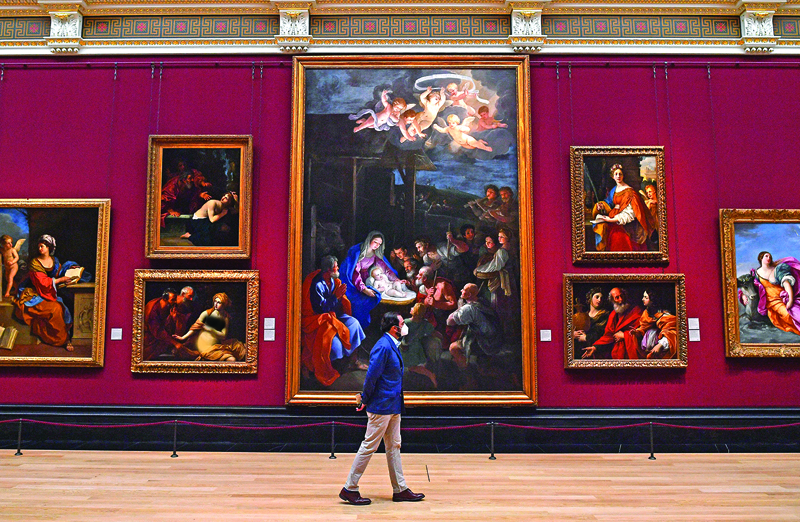
Britain’s National Gallery reopened yesterday, with masks recommended and social distancing and advance booking mandatory, as the country continues to emerge from three months of coronavirus lockdown. The central London venue is the first major art museum in the British capital to open its doors after closing in late March along with the rest of the hospitality, tourism and cultural sectors. Visitors must now book in advance, are advised to wear face coverings and follow signposted routes around the space which, at 46,396 square metres (500,000 square feet) is roughly the size of six football pitches.
Gallery director Gabriele Finaldi told reporters he hoped initially for around a quarter of the usual number of visitors—or 3,000 to 4,000 people per day. The prestigious venue, located in the heart of London overlooking Trafalgar Square, has signposted three different one-way routes through its various wings to ensure social distancing. It is also providing hand sanitising gel and scrapped audio guides. “We had two primary objectives,” said Chief Operating Officer Paul Gray. “One was to make sure that we made visitors feel safe and that we reassured them but equally we wanted to make it an enjoyable experience.”
The National Gallery’s daily hours have been reduced from eight to five, though on Friday they will be extended to 10 hours. However, Gray invited people to linger in front of paintings and “take their time to enjoy them”, with the gallery able to stay open later if necessary. “We’ve got that extra capacity, by opening longer if we need to if it’s busy, which would be a nice problem to have,” he added.
Tate Modern to follow
The National Gallery was founded in 1824 and has a collection of more than 2,300 paintings dating from the mid-13th century to the 1900s. It closed its doors on March 18, five days before the country was ordered into full lockdown, and like many cultural institutions has seen its finances ravaged by the lockdown. The government on Monday announced a £1.57 billion ($1.96 billion, 1.73-billion-euro) package to help the sector survive the crisis, following increasingly desperate calls for help. The National Gallery—which like its two great big rivals the Tate Modern and the British Museum is free to visit—relies on a mixture of state funding and the proceeds of exhibitions, memberships and patronage as well as endowments and trusts.
It is the wealthiest of the trio, according to a 2018 survey by the Times, which estimated its reserves then were £217 million. The Tate Modern, which houses a collection of contemporary art in a former power station on the banks of the River Thames, will reopen on July 27 along with its sister gallery Tate Britain, which exhibits older works. However, no date has been given for the reopening of the British Museum, seen as the country’s flagship of cultural heritage with famous exhibits like the Elgin Marbles and the Rosetta stone.
The Tate Modern is Britain’s most visited museum, attracting 5.87 million people in 2018, compared to 5.83 million visitors to the British Museum, according to the Association of Leading Visitor Attraction. The National Gallery trails close behind in third, with some 5.7 million visitors that year.—AFP

